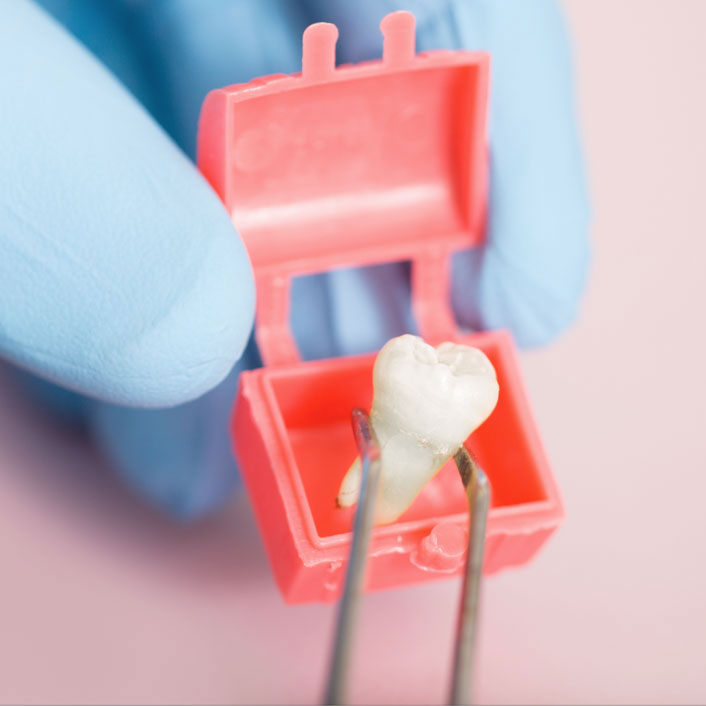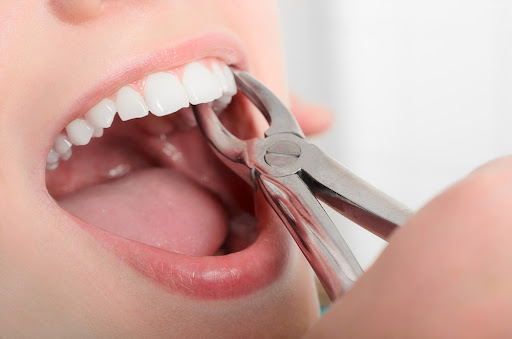
Gentle, Advanced Tooth Extractions
Tooth extraction is often an anxiety-provoking procedure, but the skilled dentists at Bell Family Dentistry in Riverbank, CA, understand how to make patients comfortable throughout the process. We utilize the latest techniques and advanced technology to ensure your tooth extraction is as quick and painless as possible. Whether you require a simple erupted tooth removal or complex surgical extraction, you can trust our team to deliver safe, gentle care.
Don't live with tooth pain or infection any longer - call Bell Family Dentistry at (209) 869-4505 to schedule an extraction and get back to enjoying your smile! Our compassionate doctors will evaluate your situation and recommend the best treatment to restore your oral health.
Reasons for a Tooth Extraction

Severe Tooth Decay/Infection
Tooth decay that has progressed deep into the tooth structure often can’t be repaired with fillings, crowns, or root canals. If the decay reaches the pulp and blood vessels of the tooth, it can cause a painful toothache and dental abscess. Extracting the infected tooth helps eliminate the source of the infection.
Broken or Damaged Teeth
Teeth that are cracked, fractured, or broken from injury often need extraction, especially if the damage affects the root. Restorations can’t repair the tooth if the damage is too severe. Leaving damaged teeth in can lead to infection.
Orthodontic Treatment (Braces)
Sometimes tooth extraction is necessary to create space in the jaws for proper tooth alignment with braces. Common extractions for orthodontics include the removal of wisdom teeth and first premolars.
Crowding/Misalignment
Overcrowded or misaligned teeth may require extraction to allow the remaining teeth to fit properly within the jaws. Front teeth that are out of position may be extracted to allow back teeth to shift forward.
Types of Tooth Extractions Performed by Dr. Bell in Riverbank

Dr. Brent Bell uses different tooth extraction techniques depending on the tooth's position and condition. Common methods include:
Simple Extraction
A simple extraction is performed on a tooth visible in the mouth. Dr. Bell numbs the area, loosens the tooth with an elevator, and uses dental forceps to remove it. Simple extractions have a short recovery time.
Surgical Extraction
Surgical extractions are performed when a tooth isn’t visible, like wisdom teeth. Dr. Bell numbs the site, makes a small incision in the gum and bone, and removes bone if needed to access the tooth. Stitches are often placed to close the site.
Complicated Extraction
A complicated extraction requires removing sections of bone or cutting the tooth for removal. These are used for badly broken down teeth or abnormal tooth positions. It takes more time and the recovery is longer.
The Tooth Extraction Process at Bell Family Dentistry
Dr. Bell follows precise protocols to safely extract teeth and minimize patient discomfort. Here is what to expect during the procedure at our Riverbank dental office:
Examination and X-Rays
Dr. Bell will examine the tooth and surrounding tissues. He’ll also take X-rays, which help determine the tooth root position and shape to plan the tooth extraction.
Anesthesia Options
Local anesthesia (numbing shots) is used for simple extractions. IV sedation or general anesthesia provides deeper relaxation for surgical cases.
Tooth Removal
Dr. Bell uses elevators to loosen the tooth initially. Then dental forceps grip and remove the tooth with gentle rocking motions. If necessary, he may place stitches to close the opening.
Aftercare
Following tooth extraction, Dr. Bell controls bleeding and places gauze in the socket near the extraction site. Post-op instructions explain home care for optimal healing.
Recovery After a Tooth Extraction
Proper aftercare following tooth extraction is vital. Here's what to expect during the recovery process with Dr. Bell:
Pain Management
Some level of discomfort is normal after a tooth extraction. Dr. Bell may recommend over-the-counter pain relievers like ibuprofen or acetaminophen to control pain. Take medication before the numbness wears off to stay ahead of the pain. He may prescribe stronger prescription pain medication for more complex extractions or patients with low pain tolerance. We also suggest applying ice to the outside of your jaw or mouth to reduce swelling.
Diet and Eating Modifications
We recommend a soft foods diet for the first 24 to 48 hours after tooth extraction.
- Avoid very hot or spicy foods that can irritate the site.
- Cold foods like ice cream can help soothe areas in the mouth.
- Avoid chewing directly on the extraction site while it heals.
- Cut food into smaller pieces and chew on the opposite side.
- Blenderized and liquid meals such as mashed potatoes and other foods make eating more comfortable.
- Slowly progress to more solid foods over a week as comfort permits.
Activity Restrictions
Avoid smoking, drinking alcohol, spitting, and drinking through a straw during the first 24 hours. These actions create suction that can dislodge the blood clot and delay healing.
You should also restrict vigorous exercise and physical activity for at least five to seven days after the procedure. Activities like jogging, weight lifting, swimming, and aerobics may disrupt healing. Limit talking, brushing, and rinsing near the site as well initially.
Potential Complications
Call our Riverbank office immediately if you experience heavy or uncontrolled bleeding from the extraction site. This could indicate a dislodged blood clot. Rinse the mouth gently with cool water and apply light pressure with gauze.
Swelling that worsens or spreads also needs prompt attention - it may signify an infection. Severe throbbing pain that medication doesn’t reduce can signal the onset of a dry socket. This requires additional care to treat properly.
Replacing Extracted Teeth at Bell Family Dentistry
Dr. Bell offers several tooth replacement options after extractions in Riverbank, such as:
Dental Implants
Dental implants fuse permanently to the jawbone, providing a strong base for a crown. They help prevent bone loss after extractions.
Bridges
A dental bridge uses crowns on the teeth adjacent to the gap to hold a false tooth in place. Bridges require filing down the support teeth.
Partial or Full Dentures
Removable partial or full dentures can replace a single tooth or multiple missing teeth. Dr. Bell creates custom-fitted dentures tailored to your mouth.
Frequently Asked Questions
Is a tooth extraction painful?
Dentists use local anesthesia to numb the area around the tooth, so you shouldn't feel pain during the procedure. Some pressure and pulling sensations might be felt, but there should be no pain. Post-extraction, mild discomfort or soreness is common and can be managed with prescribed or over-the-counter pain medications.
How long does it take to recover from a tooth extraction?
Recovery time varies depending on the complexity of the extraction. Typically, it takes a few days to a week for the initial healing. Complete healing of the extraction site may take several weeks. Following post-operative care instructions, like avoiding certain foods and activities, is crucial for a smooth and speedy recovery.
Are there any risks or complications associated with tooth extractions?
While tooth extractions are generally safe, there are potential risks, such as infection, dry socket (where the blood clot is dislodged), damage to surrounding teeth or tissues, and nerve injury. Following aftercare instructions, taking prescribed medications, and reporting any unusual symptoms to your dentist can help minimize these risks.
Can a tooth extraction affect adjacent teeth or jawbone?
Sometimes, adjacent teeth or the jawbone might be affected by a tooth extraction. Nearby teeth could shift into the space left by the extracted tooth, leading to misalignment. Additionally, prolonged absence of a tooth can cause bone loss in the jaw. Dentists might recommend options like implants or bridges to prevent these issues.
Trust the Experts at Bell Family Dentistry
Suffering with a painful, infected tooth can make you feel helpless and alone. The thought of undergoing extraction may fill you with dread. But at Bell Family Dentistry, we want to reassure you – you don’t have to handle this by yourself. Our caring dentists and staff are here to support you every step of the way. We will explain your options clearly and help you choose the best treatment plan to resolve your tooth infection.
You can lean on us for understanding and relief. Take the first step and call (209) 869-4505 to schedule an appointment with our Riverbank dental office. We proudly serve new and existing patients in Riverbank, as well as the surrounding areas such as Oakdale or Del Rio, CA.


